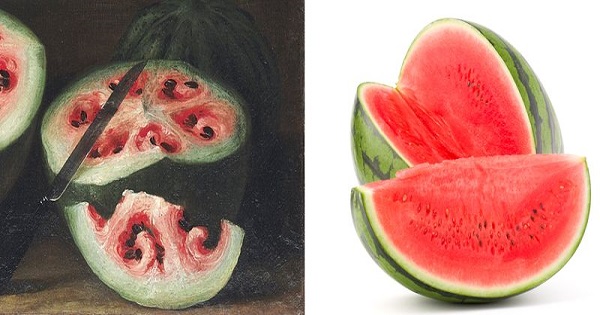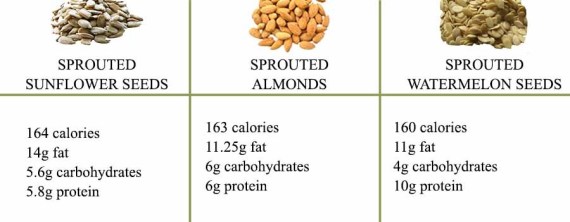Watermelon Then And Now – Is the Seedless Watermelon Better For Us?

Watermelon Pictured From The 1600’s Was Sweeter And Definitely More Seedy
The above picture displays a mid-1600 painting of a “then” watermelon against an image of today’s watermelon.
This painting done by Roman artist, Giovanni Stanchi, c. 1645-1672, (worth over upwards of $150,000 by the way) portrays a watermelon that had distinctly different characteristics than what we have today.
Watermelon originally grew in Africa, but became domesticated in the Middle East and Southern Europe in the mid-1600’s and became widely grown there.
This 17th century watermelon is believed to have had high sugar content,
What happened to the watermelon?
…Over time, we’ve bred watermelons to have the bright red color we recognize today. That fleshy interior is actually the watermelon’s placenta, which holds the seeds. Before it was fully domesticated, that placenta lacked the high amounts of lycopene that give it the red color. Through hundreds of years of domestication, we’ve modified smaller watermelons with a white interior into the larger, lycopene-loaded versions we know today.
So the red fleshy colored watermelons we have today is full of lycopene.
What is lycopene good for?
Health Benefits of Lycopene
A study on heart disease found that men with high levels of lycopene in their fatty tissues had a 50 percent reduced risk of heart disease.
Another study found that men who ate tomato products more than twice per week had a 21 to 34 percent reduced risk of prostate cancer. Those who ate 10 servings or more per week decreased their risk by 45 percent.
Women with high levels of lycopene have a 5 times lower rate of cervical cancer than those with the lowest levels.
Lycopene has also been shown to have a protective effect against stomach, colon, lung and skin cancers. It reduces the risk of arteriosclerosis by inhibiting platelet aggregation and reducing inflammation and helps to protect the skin from damage resulting from UV sun exposure. It is a common ingredient in anti-aging creams and lotions. Lycopene degrades easily so it’s important to keep the container properly sealed between uses.
One study found that when people ingest tomato products on a daily basis, they show a 30 percent increase of the ability of their skin to withstand UV radiation damage from sun exposure.
So modern agriculture has bred the watermelon to contain more lycopene – I think that’s a good thing.
There is another characteristic of the the “then” watermelon that is missing in today’s watermelon.
Yes…of course…the SEEDS!
Well about those… most of us just spit them out and forget about them. So seedless watermelon makes for more watermelon to chomp down on undisturbed by the seeds.
However, the watermelon seed just like the pumpkin seed and the sunflower seed (and all seeds from fruits) can and should be eaten.
Why?
….Because the watermelon seed carries great health benefit as well.
Health Benefits of Watermelon Seeds
- Protein
- Minerals – magnesium, phosphorous, iron, potassium, sodium, copper, manganese and zinc
- Vitamin B
- Mono and Polyunsaturated Fats
The best way to eat watermelon seeds to get the most health benefit out of them is sprouted.
Huh? …I didn’t know that. Did you?
It looks like it’s not a good thing that the seeds are bred out of today’s watermelon.
And neither is it a good thing that most people don’t eat them.
So now, what do you think is today’s watermelon better?
Leave a comment
(Photo Source: Christie Images LTD 2015 )
(Source: http://www.vox.com/2015/7/28/9050469/watermelon-breeding-paintings )
(Source: http://www.fitday.com/fitness-articles/nutrition/healthy-eating/what-is-lycopene.html )
(Article and Photo Source: http://www.livestrong.com/article/24243-health-benefits-watermelon-seeds/ )
Comments













